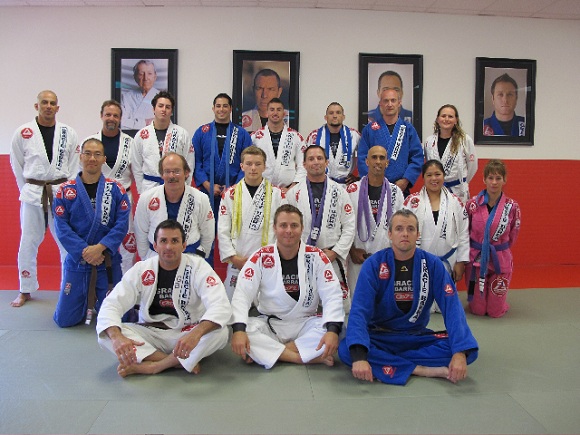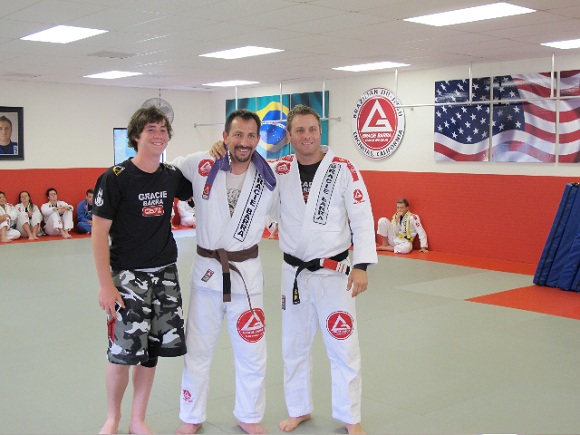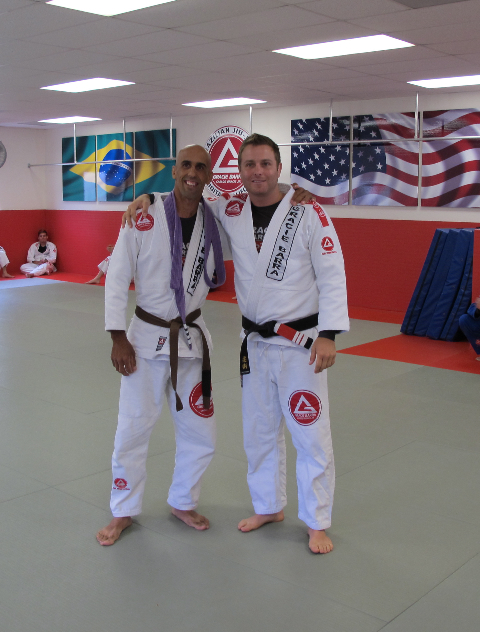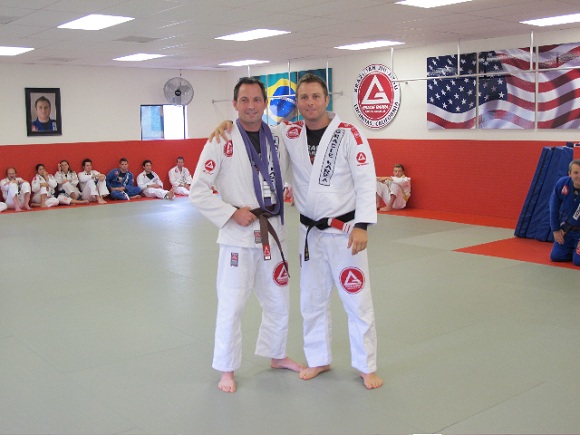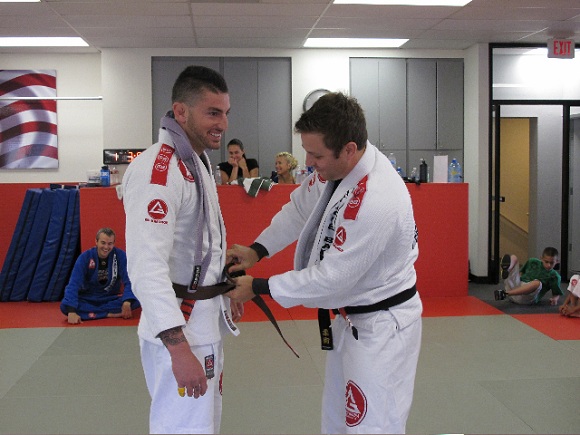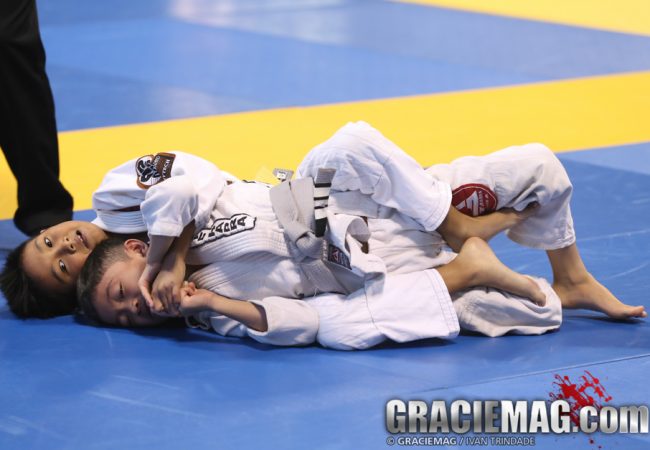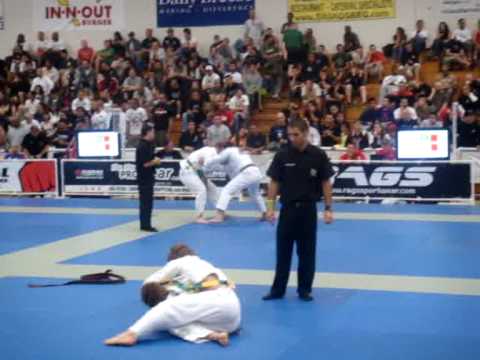Rafael Ramos and Nelson Monteiro promoted fifteen students at a special belt ceremony at GB Encinitas last weekend. As each student accepted his or her new belt, Ramos personalized the experience by commenting on the person’s history and their individual accomplishments and encounters at the school. It’s the personalized touch, along with Monteiro’s and Ramos’ vast years of experience and expertise that make their schools so successful.
Ramos, who co-owns three schools with Monteiro – GB Encinitas, GB Sorrento Valley, and GB Carlsbad – credits Master Carlos for his Jiu-Jitsu philosophy and lifestyle, his work ethic, and his overall success at his schools. He says his life changed a lot when he started training, from the way he ate, to the way he dealt with problems in life. “When I was a yellow belt Master Carlos asked me to stop drinking milk for breakfast,” he laughs, “He said, ‘why are you drinking milk? We are not supposed to drink it as adults. Do you see big, strong bulls drinking it? No.’ So, I stopped drinking milk and changed my whole family’s menu. They all had to adapt to it and I was only fourteen! I felt a change in my body, energy-wise.”
Ramos says Jiu-Jitsu also gave him confidence and changed his attitude about life. “It humbled me,” he says, “I’m still humbled every day at the school. Training, winning, losing… it makes you a better person. It takes time to understand the Jiu-Jitsu philosophy and how good it can be for you. It’s not just the techniques, but the principles and lifestyle too.”
Ramos says the belt promotion is recognition of his students’ accomplishments in Jiu-Jitsu, but to him, their biggest accomplishments are how they relate what they learn on the mats to their experiences off of them. “That’s way more important than winning a tournament or anything else.”
Ramos says he’s tried to create a school environment similar to what Master Carlos created in Brazil. “All the guys who grew up under Master Carlos or have had long relationships with him know he’s always bringing people together,” he says, “Let’s train together, eat together, travel together, live together. He always wants his family and friends surrounding him. Ever since I was thirteen, we all trained together, then we would go out and eat together. Back in the day when he took over the school, he could have named it Carlos Gracie Jiu-Jitsu, but he gave it the neighborhood name to include everyone. He never wanted the attention on him. He wanted the focus to be on the group.”
So, Ramos threw a belt ceremony that focused on his group. Out of the fifteen belts handed out, seven of them were brown belts, and at least five of those seven were over forty years old. He also promoted four students to purple belt and four to blue. He and Monteiro now have four black belts and fifteen brown belts at GB Encinitas.
Curran Thomerson received his brown belt with his son, Conner, watching, who also trains. Thomerson is humbled by his experience in Jiu-Jitsu thus far. “I’ve been with Gracie Barra since 2007. I came from another school as a blue belt. It’s been a long journey. Jiu-Jitsu teaches you that if you stick with it and don’t give up, you learn discipline and life skills more than anything else. Even more than Jiu-Jitsu skills.”
Thomerson says it’s a big deal to be over forty and receive a brown belt. “Being smashed every day by young guys like Mark Doze, I feel a real sense of accomplishment,” he says, “Being 41 and able to grapple for over an hour – I take it for granted, but other forty-year-olds can’t do it.” Thomerson is such an advocate of Jiu-Jitsu that he helps coach the juniors class.
Aaron Collins has also committed himself to a life of Jiu-Jitsu after being with GB Encinitas for five years. He coaches the kids’ classes and says it’s been a life-changing experience for him. He was also promoted to brown belt and says it’s an unbelievable feeling. “I’m honored that Rafael and Nelson feel my technique and ability is up to brown belt level and that they believe in me enough to allow me to teach classes for them,” he says, “Being able to work with the kids has changed my life for the better. I get to work with the future of this world and be a positive influence in their lives. It’s opened my eyes that it’s not just about being good at Jiu-Jitsu, but also about making a difference in someone else’s life off the mats.”
Duane Dwyer is 49 years old but has the exuberant, outgoing personality of someone much younger. He’s been training since 2005 and received his brown belt at the ceremony. As a current police officer and former military man, he sees Jiu-Jitsu from a different perspective. “I love the competitive side of the sport and the street (self-defense) side of the sport,” he says, “This school is vastly deep in both aspects of competition and self-defense. You can do it all here.”
Reflecting on his journey to brown belt, Dwyer says, “Nelson asked me to come help him at a video and interview shoot for a magazine when I was a blue belt. He didn’t tell me why he needed me, but I figured it out once I got there. They needed to throw someone and there were no mats on the floors,” he laughs.
Dwyer says he will never forget when the interviewer asked Nelson if he remembered getting his black belt. ”Nelson said, ‘Of course.’ Then they asked him if it was monumental. I was thinking that I couldn’t even imagine what it would feel like and then Nelson says with complete composure, ‘You know, I think my greatest day was getting my blue belt.’ He said that all the anxiety was over then. All the unfamiliarity and confusion and complications that add to the sport, they’re over. You’ve made it through the learning curve. It was impressive.”
Dwyer says what he loves most about Jiu-Jitsu is that after almost seven years of training and taking other martial arts before it, he still has eye-opening experiences all the time. “I’m still always learning something new,” he says, “People told me other martial arts would change my life, but they never did. Jiu-Jitsu actually did.”
Jusok “Juice” Lee, who co-owns GB Carlsbad, received his brown belt after five years of training. For him, Jiu-Jitsu originally was about promotions and belts. “The longer I did it, the less it became important,” he says, “It became more about concentrating on where I was. I see Jiu-Jitsu a lot like life. You walk your path and you suddenly you’ve made progress. Then you put your head down and keep walking. I look around and see I’ve now progressed in belts.”
Lee loves how Jiu-Jitsu mimics life. “It’s about everyday battles,” he says, “When you’re on the mats, giving your all and testing yourself, you apply that in life. You have a difficult coworker; he’s like an opponent on the mats. How am I going to display patience with this individual? How can I view the challenge? The challenge changes, but the fight is still the same whether it’s on the mats or off. I try to make it a positive experience. I step up and say I’m not going to tap out in life, I’m going to face this issue and deal with it.”
Lee says he’s always learning something new in Jiu-Jitsu and his new school is no different. “It’s a classic Jiu-Jitsu learning experience,” he says, “I now get more excited about my students’ success than my own. They are pulling off moves that are more exciting to see than if I was doing them.” Lee says Jiu-Jitsu is more than just the techniques on the mats. “It’s about changing your life and improving your life in all aspects: spiritual, physical, mental, and emotional.”
Mark Doze is 24 years old and co-owner of GB Sorrento Valley. He is the youngest GB school owner and now the “owner” of a new brown belt. Doze was emotional about his promotion because it didn’t come easily. At one time he was not living a healthy lifestyle, but Jiu-Jitsu changed all that. As he looked around the room, he says he saw again how he could change his students’ lives for the better. “The way I was changed, I now have the opportunity to change other people,” he says, “I want to help people make better decisions for themselves. I could care less if my students ever win a tournament, but if they come to me and say they’re making better decisions off the mats as a father, a son, or a brother, that’s the most important thing to me.”
Doze has a lot of respect for Ramos and the older guys on the mats. “It was an honor to get my belt from Professor Rafael Ramos,” he says, “I look up to him. I respect him so much and I couldn’t ask for a better group of men to get promoted with. All those guys are over forty. I feel like a son to them. I feel like they’re always looking out for me. It was an honor to get my belt with the guys I started training with. I love those guys.”
Regardless of his age, Doze says he looks forward to being able to help change other’s lives for the better. “I’ve been through a lot for a young person,” he says, “My dad taught me that you can doubt anything in the world, but you should just question yourself. Never doubt yourself. I want to impart that knowledge to others and show them that they can do anything in life they want to do.”
Ramos says, “We had so many great stories on the mats today. Guys improving their lives, their relationships with their families… we are on the right path trying to make Master Carlos proud.”


